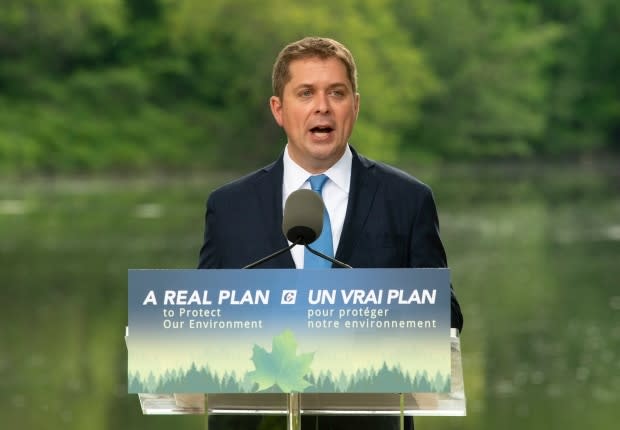A campaign loss on climate change would turn the issue into a political 'loser': Trudeau
Climate change will be seen as an "electoral loser" by future governments if Canadians vote for a party that doesn't take real action on the issue, Prime Minister Justin Trudeau says in a new book.
"If we don't demonstrate that we can take real, tangible actions on the environment and continue to get the support of Canadians, no Canadian government's going to bother defending the environment anymore," Trudeau tells CBC senior writer Aaron Wherry in Promise and Peril: Justin Trudeau in Power, released this week.
"It'll be seen as an electoral loser. And I can't have that, we can't have that, we can't afford ... Canada can't afford that," Trudeau told Wherry.
Climate change is expected to be one of the key issues of the coming federal election campaign.
Green Party Leader Elizabeth May described Trudeau's argument as "perverse."
"The single biggest obstacle (on climate change) has been incremental political thinking. Is this issue an election winner? Is this a loser?" May said in an interview with CBC News.
"So that kind of framing for me is really interesting because it's perverse and that's exactly why we're in the mess we're in now, is that we have not been honest ... Our actions are not consistent with what is required."
May said that the Liberals' policy is not climate action — she called it a few steps in the right direction being undermined by the government's purchase of the Trans Mountain pipeline expansion project and the retention of Stephen Harper-era emissions targets.
"It is a do-or-die time. By the 2023 election, if we haven't made the transition to a plan that gets us off fossil fuels on the kind of accelerating basis that's in our [Green Party] policies, we will certainly not have an opportunity to do so later, because the window on 1.5 degrees Celsius will have closed and we don't get another chance," she said.
A spokesperson for Conservative Leader Andrew Scheer did not directly address Trudeau's assertion to Wherry. "What Justin Trudeau has put forward to Canadians is not an environment plan. It's a tax plan," said Daniel G. Schow.
The People's Party of Canada declined comment and the NDP did not respond to a request for comment.

The Green Party and the NDP have made climate action — including carbon pricing — a key part of their campaign platforms.
Scheer has put forward his own climate plan but opposes the Liberal government's carbon levy, claiming it will make life more expensive for Canadians — a position echoed by conservative politicians across Canada, including premiers Doug Ford, Jason Kenney, Scott Moe and Brian Pallister.
Scheer has said the Conservative plan for the environment would meet Canada's emissions reduction targets by targeting major polluters, while also eliminating the current federal carbon tax regime.
Climate change is a ballot box issue
Climate change is shaping up to be an issue that moves votes this fall.
According to a poll by Abacus Data released last week, 82 per cent of respondents say climate change is a serious problem and 42 per cent of respondents described climate change as an "emergency." Just 5 per cent said climate change was "not a problem at all."
Of the five issues listed in the Abacus poll, climate change ranked as the second most important issue to respondents, polling behind only the rising cost of living and ahead of income inequality, increasing automation and increasing immigration to Canada.
The poll — of 2,000 Canadians aged 18 or older, commissioned by Simon Fraser University's Seth Klein — was conducted July 16 to 19 using a weighted random sample of panellists. A comparable probability-based sample would have a margin of error of 2.1 per cent, 19 times out of 20.
A CBC News poll published in June found that nearly two-thirds of Canadians see fighting climate change as a top priority, but half of those surveyed would not shell out more than $100 per year in taxes to prevent climate change.
A carbon tax has not been an electoral winner in Canada in the past.
As Wherry writes, Stéphane Dion was the last Liberal leader to place a carbon tax at the centre of a Liberal campaign.
In 2008, Dion proposed the Green Shift, a program that would tax polluters and shift the revenue toward a combination of tax relief, poverty reduction and environmentally friendly investment. Dion lost to Stephen Harper; his failure to communicate his carbon plan was widely seen as one of the factors leading to his defeat.

Trudeau has long framed the climate change fight as two-pronged, requiring both a plan for the economy and a plan for the environment.
"People aren't unreasonable — if they see an economic plan that goes with an environmental plan that involves communities, particularly Indigenous communities, people will say, 'Okay, that makes sense,'" Trudeau told Wherry. "It's really hard to build a bridge between those two things, but if you want Canada to work in the long term, like, I've got to try and build that bridge, because if not me, who?"
Despite the Liberal government's actions to date on climate change, Canada is still projected to be 79 megatonnes short of its Paris Agreement goal of reducing emissions for 2030 by 302 megatonnes.
Neither the Liberals nor the Conservatives have detailed a plan that would close that gap on Canada's climate commitments.


